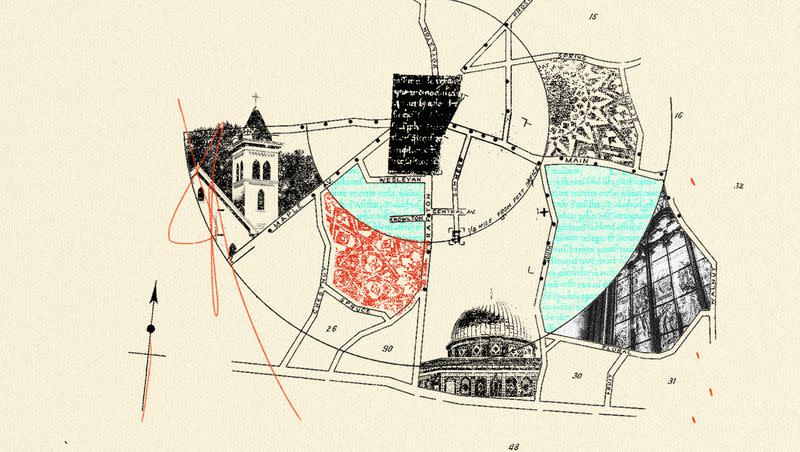Faith under fire

- Oops!Something went wrong.Please try again later.
Think of it like America’s most wanted list for perpetrators of religious violence. Each year, the State Department names and shames the countries most guilty of restricting religious freedom. But rather than seeking high-profile arrests, U.S. government officials seek a safer future.
Pressure from both governmental and nongovernmental organizations is key to bringing about meaningful change.
“Some 80% of the world’s population still cannot practice their faith without serious restrictions or risk. And that has consequences for us all. Time after time, we’ve seen how religious persecution can undercut stability and inclusive economic development, spiraling into violence and conflict,” said Secretary of State Antony Blinken at January’s International Religious Freedom Summit in Washington, D.C.
The latest list of countries of particular concern, released in November, captures the many forms religious violence can take — and the wide variety of faith groups it affects. Religious believers of all stripes are suffering, even as the movement to help them grows in the United States.
Related
The State Department’s current countries of particular concern:
Burma: Minority religious groups, including Rohingya Muslims, are routinely the targets of discrimination and violence. The Rohingya are unable to travel freely within the country and leaders won’t facilitate the return of Rohingya refugees to their homes.
China: The government closely tracks religious activity and severely punishes people of faith believed to pose a threat to the Chinese Communist Party. The Uyghurs, a predominantly Muslim minority group, are subject to a particularly intense level of surveillance and interference. The Biden administration has classified China’s treatment of the Uyghurs as genocide.
Cuba: Faith leaders have been beaten, detained and harassed as part of the Cuban Communist Party’s effort to control religious activity within the country. The government denies official recognition to some faith groups and does not respond to applications for recognition submitted by others.
Eritrea: Members of unregistered religious groups face imprisonment and harassment. Some are forced to renounce their beliefs to secure their release from detainment.
Iran: Iran is an Islamic republic, and members of minority religious groups can face imprisonment over accusations that they’ve interfered with or insulted Islam. Muslim citizens are not allowed to convert or denounce their beliefs.
North Korea: People of faith experience extreme persecution, including imprisonment and torture. Human rights experts say religious exercise is “nearly impossible” in the country.
Nicaragua: Catholics, in particular, experience regular harassment, from interference with worship services to travel restrictions. Just this year, in February, five priests were sentenced to 10 years in prison after being accused of conspiring with pro-democracy activists.
Pakistan: The government has failed to crack down on mob violence against Christians, Hindus and members of other minority religions. Multiple people have died in recent years after being accused of blasphemy.
Russia: Jehovah’s Witnesses, some evangelical Christians and others are classified as religious extremists and detained or abused as a result.
Saudi Arabia: The law does not grant a right to religious freedom. Those who don’t practice Sunni Islam are vulnerable to harassment and imprisonment.
Tajikistan: The government oversees multiple aspects of religious life, regulating everything from faith-related building projects to the participation of children in church events. People of faith can face imprisonment if they’re caught associating with banned groups.
Turkmenistan: Religious groups navigate a challenging registration process in order to operate legally in the country. Even after clearing administrative hurdles, they face ongoing interference, including raids.
Policymakers can use economic sanctions, travel bans and other penalties to pressure countries of particular concern to change their ways.
The U.S. government has a number of tools at its disposal as it works to address severe religious freedom violations in these countries. Policymakers can use economic sanctions, travel bans and other penalties to pressure countries of particular concern to change their ways.
Although significant, the State Department’s formal tracking and sanctioning process does not tell the whole story of what’s happening around the world when it comes to religious freedom, said Sam Brownback, who served as U.S. ambassador-at-large for international religious freedom during the Trump administration. Officials often face pressure to leave certain nations off the list of countries of particular concern due to other policy priorities. And the list also sometimes fails to capture what’s happening in real time.
“The desk that represents a country … rarely wants it on a sanctions list. They’ll say, ‘Look, we’re working with them. You’re going to make it harder to work with them,’” Brownback said.
The State Department’s November list doesn’t account for growing conflict in Azerbaijan, where Armenian Christians are struggling to access food and other resources, or Nigeria, where terrorist groups are moving in and exacerbating tensions between Christians and Muslims. These are just two of many countries that aren’t officially labeled countries of particular concern but are still watched closely by international religious freedom advocates, Brownback said.
In his remarks to the International Religious Freedom Summit in January, Blinken acknowledged that nongovernmental organizations play an essential role in efforts to protect people of faith around the world. He praised participants for frequently being “the first to report persecution and the first to support those in desperate need.”
“Your courageous advocacy empowers governments like ours to press other countries for greater accountability and action,” Blinken said.
Pressure from both governmental and nongovernmental organizations is key to bringing about meaningful change, Brownback said. He added that the bright spot among today’s many religious freedom conflicts is how many more people are involved in bringing that pressure these days than they were in the past.
“When I started doing some of this work, as someone recently reminded me, it was me and four other people in the room. Now, it’s a global movement that has been birthed and is learning to walk,” Brownback said.

